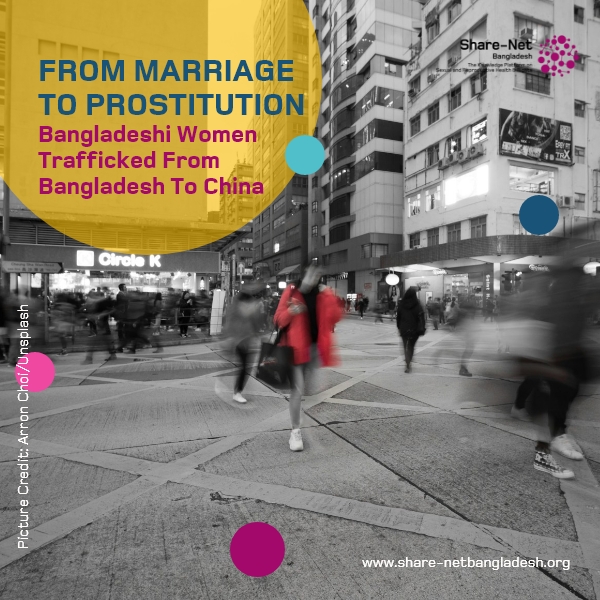From Marriage To Prostitution: Bangladeshi Women Trafficked from Bangladesh to China
“Organised human traffickers took advantage of our helplessness and trafficked my daughter to China for sexual exploitation,” read the complaint of a distraught mother in Dhaka. This tragic case is one of many, revealing a horrifying trend of Bangladeshi women being sold to China under false pretenses, highlighting significant issues in sexual and reproductive health and rights (SRHR).
On July 1 last year, a widow from Chuadanga married her daughter, referred to as Lovely, to a Chinese man named Cui Po Wei, hoping to escape poverty. The family believed that Cui had converted to Islam and would settle in Bangladesh. However, six months later, Lovely was taken to China and forced into prostitution. According to the case filed on March 31 this year, Lovely revealed in a desperate call that Bangladeshi traffickers sold her to Cui for Tk 10 lakh.
The sexual and reproductive rights violations in this case are stark. Lovely’s plight underscores the vulnerabilities faced by underprivileged women, often duped into sham marriages and trafficked for sexual exploitation. This issue not only violates their human rights but also disrupts their reproductive health, contributing to broader societal and developmental challenges.
Human trafficking directly impacts the Sustainable Development Goals (SDGs), particularly those related to gender equality, health, and well-being. In another incident, a Chakma woman reported that her sister was held captive by traffickers in Dhaka, with plans to take her to China. The gang, promising education and a better future, forced her into marriage after taking indecent photos.
The Criminal Investigation Department (CID) is currently investigating these cases, which involve local accomplices who arrange these marriages and facilitate the trafficking. A resident of Uttara reported knowing two groups actively seeking vulnerable women from indigenous communities for Chinese nationals. These locals receive between Tk 10 to Tk 20 lakh per woman trafficked.
This crisis calls for urgent government action to protect SRHR and combat human trafficking. Gautam Dewan, president of the CHT Citizens Committee, urged for increased monitoring to prevent underprivileged women from becoming victims. Noor E Alam Mina, deputy inspector general of Chattogram range police, confirmed that the police are investigating these trafficking networks.
In 2018, diplomatic efforts successfully brought back three trafficked women from indigenous communities. Yet, the problem persists, as illustrated by recent cases in Rangamati and Khagrachhari, where young women were either rescued from traffickers or already taken to China.
The Chinese embassy in Bangladesh stated that the Chinese government is committed to protecting women’s and children’s rights and cracking down on human trafficking. However, the embassy has not received notifications from the Bangladesh government regarding these cases.
Addressing this crisis requires a multi-faceted approach, focusing on stringent law enforcement, international cooperation, and comprehensive SRHR education and support for vulnerable communities. Only then can the cycle of exploitation and human trafficking be broken, ensuring safety and dignity for all women.
Source: The Daily Star
Source Contributor: Laltanlian Pangkhua, Rangamati correspondent, The Daily Star
Picture Credit: Arron Choi/Unsplash

